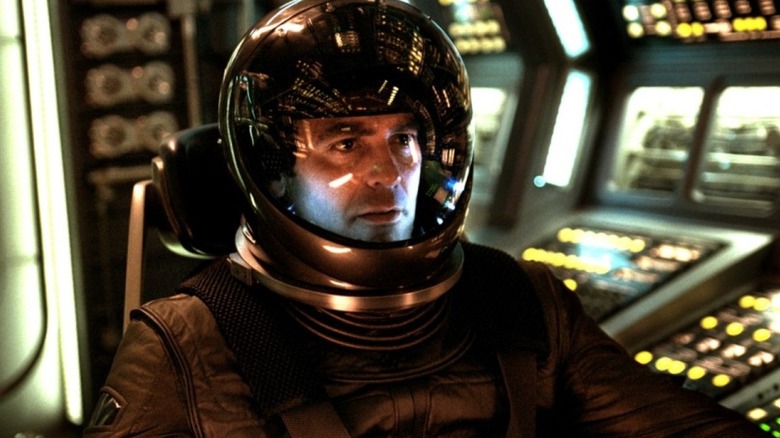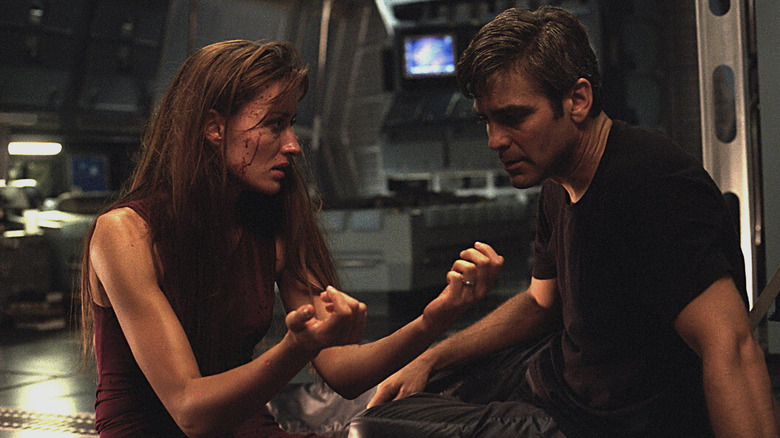George Clooney Solidified His Solaris Casting By Writing A Letter
Stanisław Lem's 1961 sci-fi novel "Solaris" had already famously been adapted to film by the masterful Andrei Tarkovsky in 1972, so there was some debate as to whether or not Steven Soderbergh's 2002 version of "Solaris" counted as a remake or simply another adaptation. Given the slow, moody, contemplative style that Soderbergh affects for his film, though, one might be tempted to say he was directly emulating Tarkovsky, a filmmaker known for his incredibly long, extended takes, paired with broad moments of silence.
"Solaris" is about a mysterious distant planet, orbited by a human-made space station. When people board the station, a strange psychic wave from the planet reaches into their minds and physically manifests their loved ones. In Soderbergh's version, George Clooney plays the lead character, and he finds himself interacting with his long-dead wife Rheya (Natasha McElhone). The duplicates, however, understand — in a very vague sense — that they are created by an alien intelligence, and don't really understand their own existence. When Clooney asks a colleague why Solaris is creating duplicates, he is met with ambiguity. "There are no answers," his friend says, "only choices."
"Solaris" wasn't a huge hit with audiences (it only netted $30 million on a $47 million budget), and even critics were split by its slow, cerebral nature. One cannot deny Soderbergh's ambition, however, in remaking a sci-fi classic about hope and death, released into a post-9/11 milieu.
Clooney once talked to Phase 9 Entertainment about making "Solaris," and how he only landed the lead role after a polite, yet impassioned plea to Soderbergh ... via a personal letter. Clooney and Soderbergh had become famous collaborators by 2002, having already made "Out of Sight" and "Ocean's Eleven" together. This time, however, a note was needed.
George Clooney believes in the power of the written word
Soderbergh and Clooney would eventually collaborate on two additional "Ocean's" movies and "The Good German," while Soderbergh would serve as executive producer on "Confessions of a Dangerous Mind" and "Good Night and Good Luck," Clooney first two features as a director. They had also formed a production company together called Section Eight Productions, started in 2000. "Solaris" came early in their professional co-producing relationship, but they were already close enough that Clooney felt he could be afforded at least a small amount of special privilege. It's unclear if Soderbergh felt in any way obligated to invite Clooney to take part in "Solaris."
Clooney, however, didn't want to come across as presumptuous. As the interviewer points out, the actor writes many letters to his Hollywood peers, as he finds it more personal, and more persuasive, than face-to-face meetings. Clooney wanted the job on "Solaris," but couldn't merely ask. He had to ask politely in print. Clooney explained:
"Steven and I are partners, and if you want to ask for something to your partner, but you don't want him to smile at you and say 'you are not the right guy for the job.' I just wrote him a letter saying, 'I don't know if you are thinking of me, or if you think I am up for the job, but I want to officially say, no hard feelings if it is not. But if you think I can do it, I'll do for free!' I think letters are good things, they last a little bit longer, and they also give everybody time to react instead of just looking at you in the eyes and going 'I don't think you are the right person.'"
Clooney, as far as I could tell, did not make "Solaris" for free. But at least his ploy worked.

